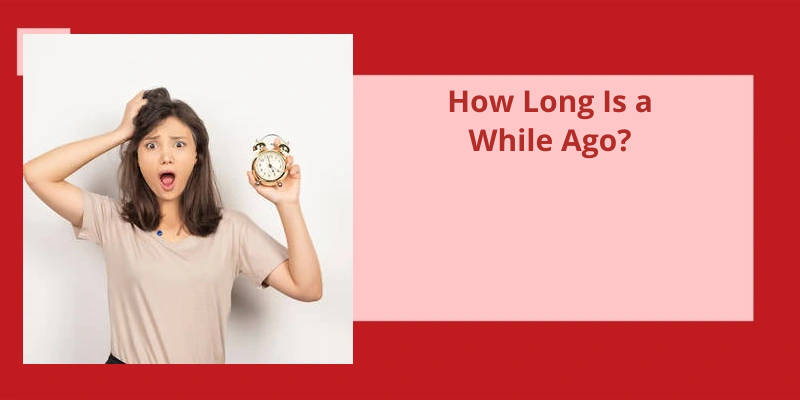Well, that's a tricky question with no definitive answer. The concept of time is a fascinating and ever-elusive phenomenon that gripped the human mind since the dawn of civilization. It can mean anything from a few hours to a few weeks – maybe even longer. The intriguing aspect of this expression lies in it’s versatility, as it finds it’s way into conversations when the amount of time passed isn’t a crucial factor in whatever is under discussion. It serves as a vague marker, allowing people to convey a sense of past time without precise measurements or specific chronological references. So, next time someone describes something as having happened "a while ago," remember that the length of that while is relative and can be as fluid as the sands in an hourglass.
What Is the Meaning of a While Ago?
The phrase “a while ago” holds a subjective meaning depending on the context in which it’s used. Essentially, it refers to a period of time that occurred in the past, although the length of this period can vary. It’s a general term that allows for flexibility, encompassing moments, days, weeks, months, or even years, depending on the circumstances being discussed.
Furthermore, the duration implied by “a while ago” can also differ based on individual perception. For some, a while ago may signify a much shorter period, while for others, it may encompass a more significant timeframe. This subjectivity adds to the fluidity and adaptability of the phrase.
This can be useful in conversations where an exact date or period may not be easily recalled or may not be crucial to the discussion.
It’s a relative term open to interpretation, allowing for flexibility depending on the context and individual perception.
Examples of How the Phrase “A While Ago” Has Been Used in Literature or Popular Culture
In literature and popular culture, the phrase “a while ago” is often used to refer to a period of time in the past. It’s a versatile expression that can be found in various contexts, such as historical narratives, memoirs, and fictional stories.
For example, in classic literature, authors frequently employ the phrase to set the stage for a story by establishing a sense of time and distance. It allows readers to understand that events took place further back in history or in a different era.
In popular culture, “a while ago” is commonly used in movies, television shows, and songs to convey nostalgia and reflect on past experiences. It serves as a way to reminisce about earlier times, evoke emotions, or create a sense of longing for the past.
Overall, the phrase “a while ago” is a widely recognized and utilized expression that adds depth and context to narratives, both in literature and popular media.
What Is an Example of a While Ago?
A while ago, I found myself reflecting on the concept of time as I saw a fox roam around in my garden. It was a peaceful afternoon, and the sighting of the mischievous creature instantly transported me back to a distant moment. The term “a while ago” resonated with the uncertain period of time that had elapsed since that encounter. The memory felt elusive, yet vivid, as if it were yesterday.
It captures an indefinite span, evoking a sense of nostalgia and longing for a moment that’s faded but remains significant. The fox in my garden, for instance, symbolizes the passage of time, reminding me of the impermanence of life and the fluidity of our experiences.
In this context, “a while ago” holds an emotional weight that extends beyond the confines of a calendar or clock. It signifies an era gone by, a chapter in the book of the past that remains open, waiting to be revisited and cherished. It also serves as a reminder to appreciate the present and the fleeting moments that define our existence.
Now that we understand the correct usage of the phrase “a short while ago,” let’s delve into other similar time-related expressions and their appropriate contexts.
Is It Correct to Say a Short While Ago?
The phrase “a short while ago” is commonly used to express a recent occurrence or event. It signifies a duration of time that isn’t particularly long, but also not excessively short. While there’s no definitive measure for what exactly constitutes a “short while ago,” it generally refers to a period within the last few days or weeks.
In everyday conversations, people often use this phrase to describe something that happened recently but doesn’t have a precise timestamp. It allows for a degree of flexibility in time reference, conveying that something occurred not too long ago without specifying an exact duration.
Whether it’s discussing personal encounters, describing recent news or events, or even referring to something mentioned in a previous conversation, this phrase serves to indicate a point in the near past.
In written English, the phrase is both grammatically correct and widely accepted. It’s usage contributes to a more conversational tone and can help the reader grasp the relative recency of the described event. Consequently, it adds a touch of informality and relatability to written texts, making them more engaging and relatable to a wide range of readers.
It’s flexibility and informality make it appropriate for both spoken and written language, effectively conveying the idea of a recent event without the need for specific time measurements.
Source: a short while ago | English examples in context – Ludwig.guru
In the realm of vocabulary, there exists a variety of synonyms to describe the notion of “a while ago” or an event occurring earlier. Phrases such as “already,” “formerly,” “heretofore,” and “hitherto” can effectively convey the temporal distance between the mentioned event and the present moment. Whether recounting a recent occurrence or reflecting on something that transpired four days ago, these words succinctly encapsulate the concept of a past timeframe.
What Is a Word for a While Ago?
When seeking a suitable word to describe a period of time that occurred “a while ago,” it’s helpful to explore various synonyms that encapsulate this adverbial notion of earlier. Among these options is the term “already,” which conveys the concept of something happening before a certain time or moment. Furthermore, another alternative is “formerly,” which indicates a previous state or condition that existed at some point in the past.
Additionally, we can consider the word “heretofore,” which suggests a period or event that took place before the present moment. This term emphasizes a historical or chronological aspect, implying a passage of time since the occurrence. Another word that can be used as a synonym for “a while ago” is “hitherto.”. This adverb conveys the idea of something occurring in the past until the current point in time. It signifies a continuous period leading up to the present moment.
Furthermore, if the desired timeframe is specifically four days ago, one can use the expression “four days ago” directly. This construction provides a clear indication of the time period being referred to and leaves no room for ambiguity or misunderstandings. By employing this exact phrase, the temporal context is firmly established, allowing for effective communication of when the past event or occurrence took place.
These adverbs provide alternatives that convey the sense of an earlier period or event.
Synonyms for “A While Ago” Such as “Previously,” “Formerly,” or “Heretofore”
When referring to the past, there are several synonyms for “a while ago” that can be used interchangeably. Some common examples include “previously,” “formerly,” and “heretofore.” These terms all convey the idea of something happening in the past, but without specifying a specific timeframe. So, if you need to describe an event or occurrence that took place some time ago, you can use these synonyms to add variety to your writing.
What Is a Synonym for Long Past?
How long ago is a while ago? This is a question that often arises when we try to reminisce about events from the past. The concept of time can be quite elusive, and our perception of it can vary greatly depending on our personal experiences. When we refer to “a while ago,” we’re generally describing a period of time that’s long past.
One synonym that comes to mind for long past is “aeons ago.”. The term “aeons” suggests an immeasurable span of time, conveying the idea that the event or situation being discussed occurred in the distant past. Another synonym is “ages.”. We often use this word to refer to a very long time span, emphasizing a considerable distance of time between the present moment and the event in question.
“Eternity” is another word that can be employed as a synonym for long past. This term carries a sense of timelessness, suggesting that the event occurred so long ago that it feels almost eternal in it’s distance from the present. Lastly, the phrase “four days ago” can also be considered a synonym for long past, although it’s more specific in it’s time reference. Nonetheless, it can still evoke a sense of elapsed time and distance from the present.
In the Distant Past
- The ancient civilizations
- The mysterious lost cities
- The enigmatic artifacts
- The mythical creatures
- The forgotten legends
Conclusion
In essence, the phrase "how long is a while ago" encompasses a subjective measure of time that varies based on personal interpretation and contextual relevance. It’s flexibility allows it to encompass a broad spectrum of time frames, from a few hours to several weeks or more. When employed in conversation, it often signifies that the specific duration of time elapsed isn’t of significant importance to the topic at hand. This fluidity makes "how long is a while ago" an adaptable phrase that can be applied across diverse situations, demonstrating the intricacies of human language and our ever-evolving understanding of time.






